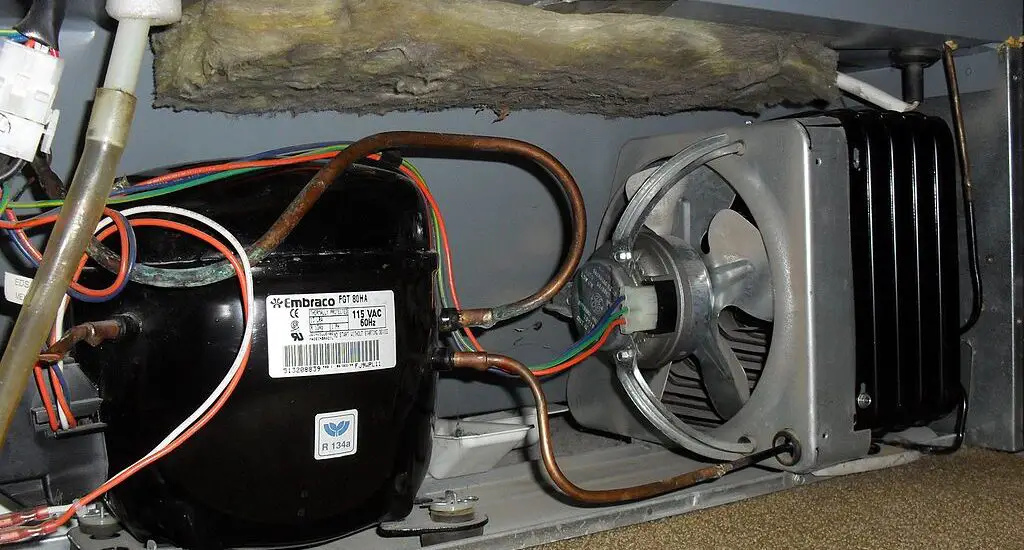Which compressor is best for refrigerator? That’s like asking who’s the coolest superhero – it’s a battle royale! But don’t worry, we’ve got your back. The linear compressor takes the cake for being the superhero of compressors, but hey, some sidekicks like the reciprocating and rotary compressors aren’t too shabby either. They all got their pros and cons, so let’s chill and break the ice on this cool topic.

Table of Contents
Understanding the Role of a Compressor in a Refrigerator
Now let’s kick things off with the MVP of your refrigerator – the compressor. This little box is the engine that powers the chilling machine you rely on every day.
The Function of a Compressor
Imagine your fridge as a super-cool club with the compressor as the bouncer. The compressor’s job? Keep the heat out and the cold in. It circulates the refrigerant, which is basically the elixir of coldness, through coils and keeps your grub icy fresh.
Types of Refrigerator Compressors
So, what are our contestants? We’ve got three musketeers here: Reciprocating, Rotary, and Linear compressors. It’s like choosing between Batman, Superman, or Wonder Woman. Each one has their own set of superpowers!
Reciprocating Compressor
Now that we’re acquainted with the heroes of the game, let’s meet our first player: the reciprocating compressor. Think of this one as the classic workhorse.
How a Reciprocating Compressor Works
Picture a rowing machine – y’know, the thingy at the gym that makes your arms feel like they’re gonna fall off? That’s kinda what’s happening in the reciprocating compressor. It uses a piston and cylinder to compress the refrigerant and pump it through the system. Just like you pumping those muscles!
Pros and Cons of Reciprocating Compressors
These babies are like the classic superhero – reliable and have been around the block. They’re efficient, but, man, they can get noisy! They’re also a bit bulkier – think of them as the bodybuilders of compressors. Great for heavy-duty, but maybe overkill for your kitchen. According to fridge connoisseur BobVila.com, they’ve been trusted for ages.
Rotary Compressor
Our second contender in this frosty competition is the rotary compressor. A bit of an upgrade from the classic reciprocating type, it’s the middle child of the compressor family.
How a Rotary Compressor Works
The rotary compressor is like that kid spinning around and around until they can’t walk straight. It’s got these roller thingamajigs that spin around, pushing the refrigerant through. It’s like a carnival ride for cold air!
Pros and Cons of Rotary Compressors
The rotary compressor is sort of the middle child – it’s quieter than the reciprocating, but not as silent as the linear. It’s pretty efficient and takes less space but comes with a higher price tag. This Old House, the handy-dandy household guide, gives rotary compressors a thumbs-up for smaller spaces.
Now for the star of our show! Linear compressors are like the stealth ninjas of the refrigerator world. But how do they do their cool tricks?
How a Linear Compressor Works
Linear compressors move in a straight line – hence, the name. They’re smooth operators, sliding back and forth, squishing the refrigerant and sending it on its chilly way. Think of it as a rocking chair for refrigerants!
Pros and Cons of Linear Compressors
Linear compressors are the quietest and most energy-efficient of the bunch. They’re also super durable – like the Iron Man of compressors! But, like a top-of-the-line superhero gadget, they can cost a pretty penny. They’re worth the investment for larger refrigerators and long-term use.
Check out these other related articles…
How to Reset a Refrigerator Compressor: In 4 Easy Steps
Fridge Freezer Compressor Not Starting: 4 Proven Solutions
Water in Fridge Compressor: 3 Telltale Signs & Solutions
How to Wire a Fridge Compressor: In 4 Easy Steps
How to Find Low Side of Refrigerator Compressor: Quick Guide
Comparative Analysis: Which Compressor is Best for Refrigerator?
It’s judgment time! Which compressor is best for refrigerator? How do these compressors stack up against each other? Let’s put them under the microscope.
Energy Efficiency
Energy efficiency is a biggie. No one wants a fridge that guzzles electricity like it’s free! Linear compressors, with their smooth, straight-line movement, tend to be the most energy-efficient. Energy Star, the authority on all things power-saving, definitely nods to the linear compressor in this aspect.
Durability and Maintenance
How about longevity? Well, the linear compressor wins again. It’s built like a tank – it can take the heat (or cold, in this case) and keep going. Reciprocating and rotary compressors can be long-lasting too, but they might need more maintenance.
Noise Levels
No one wants a fridge that sounds like a freight train. So, in terms of noise, the silent but deadly linear compressor is the clear winner. It barely makes a peep!
Price and Availability
But what’s the damage to your wallet? Linear compressors can be pricier, but you get what you pay for, right? Rotary compressors are a bit cheaper, and reciprocating compressors are the most budget-friendly of the bunch.
Conclusion
So, which compressor is best for refrigerator? Like choosing a superhero, it all depends on what you need. Want the top-of-the-line, silent, and energy-efficient option? Go for linear. Need something a bit cheaper but still reliable? Rotary’s your guy. On a tight budget but still need a trusty sidekick? Reciprocating’s got your back. Now, armed with your new knowledge, go forth and keep it cool!